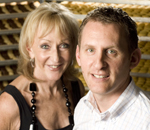EXTRA: ‘Australian made’ making six big mistakes
EXTRA: PROCLAIMING products to be ‘Australian made’ is nowhere near enough to win Aussie customers according to a leading local food manufacturer.
Kez’s Kitchen founder and managing director, Michael Carp, has found that even though researchby Roy Morgan shows Australians have become more conscientious consumers of locally made food products, it is hardly carrying through to sales. 
Mr Carp said in his experience, ‘Australian-made’ food brands needed to better understand their customers, know the value of branding, be innovative in their product development, and deliver on promises more than ever.
To fail on those six vital points will see Australian food brands become less competitive and lose market share.
“Consumers may well be more aware that ‘Australian made’ gives them the freshest shelf ingredients, supports local jobs, and helps the economy, but with customers being more committed to buying Australian made, local food brands risk becoming less active in their product development and marketing,” Mr Carp said. “ Being ‘Australian made’ is only one factor among many that influences a customer’s choice to purchase, as well as a buyer’s decision to stock the product on shelves.”
Mr Carp said local businesses must maximise the advantages of being Australian made.
“A major advantage is easier access to buyers,” he said. “For instance, Kez’s Kitchen recently received confirmation by a major supermarket for five new lines and will have products on the shelves in a couple of weeks.
“If we were importing, we’d lose this lead time in the shipping alone. Always deliver on promises to buyers, because if they’ve had a bad experience with you once, it’s not easy to win them back.”
Having manufactured locally for more than 23 years, and carved a strong market share and buyer loyalty, Mr Carp is well positioned to point out where local manufacturers – particularly the new brands – make their mistakes.
He highlighted six common product and branding mistakes Australian-made companies make: 
1. They don’t offer anything different. Consumers look out for new products that will excite and engage them.
“If ‘Australian-made’ brands offer products that emulate many others produced locally, there’s little motivation for consumers to switch brands,” Mr Carp said. “They will go with a lower cost item or the one they’ve always been buying. Food businesses must remain innovative. An example at Kez’s Kitchen is our development of the Taking Cafe Home range, which unlike other snack products on the market, brings the café experience to your own home.”
2. They focus on price, not quality. Consumers don’t always go for the lowest price shelf item – and the recent research that more Australians are buying locally made regardless of price, is proof.
“Businesses need to be less concerned about reducing shelf prices and instead focus on producing a product of high quality, with a unique point of difference. A quality product is one that incorporates the best ingredients, is high in taste and texture and sometimes even offers a health benefit,” Mr Carp said
3. They don’t work on their brand. If consumers and buyers know and trust a brand, they’re more likely to buy. But these days, strong brands go further: they tell a story. Brands with a story can better engage customers, and create brand loyalty.
“Many businesses have a great story but don’t tell it,” Mr Carp said. “Ours is the growth of a biscuit business that my sister Kez began in my mum’s kitchen 23 years ago – and we take just as much pride in our products today. If food businesses don’t develop their brand image – whether they have a story or not – they’ll have a tough time reaching consumers, as major supermarkets will be less likely to stock their products. Strong brands can set a higher price and remain confident that buyers and consumers will purchase.
4. They don’t deliver on promises. If your brand and packaging makes bold statements about the products inside, you need to follow through.
“At Kez’s Kitchen, our key brand message is that we’re all about the taste, and we deliver this by producing high-flavour foods that we’re passionate about and consumers know and love. As this is a promise to consumers, we never make sacrifices on ingredients.
5. They don’t invest in packaging. While delivering on promises helps ensure repeat purchases, it’s the packaging that initially draws consumers in.
“Packaging is the most visible part of a food business, and businesses need to invest in research, development and design of the packaging,” Mr Carp said. “The packaging is also the most important platform for telling your brand story.”
6. They don’t adapt to change. Perhaps the easiest mistake is simply standing still.
“Not only are consumer needs and tastes changing, but competitors are getting better at what they’re offering. If you don’t adapt your brand and product you’ll be left behind. In a country as competitive as Australia, we need to get out of our comfort zones to continually improve.”
www.kezs.com.au
ENDS
Extra research:
1. Roy Morgan research: http://www.australianmade.com.au/media/299171/1309%20Consumer%20research%20summary.pdf

 How to resolve AdBlock issue?
How to resolve AdBlock issue?